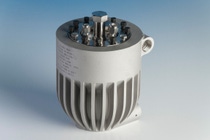Actualités & Médias
Layer upon layer – and safe!
- First 3D-printed pressure equipment manufactured and certified
- Autoclave manufactured by selective laser melting
- Adapted geometry allows for faster temperature cycles
Additive manufacturing is a new manufacturing technology to produce parts which are used in both research and production plants at BASF. The goal is to use the new freedom of design to optimize components – and thus improve chemical processes. “We use additive manufacturing technology when it offers added value compared to conventional manufacturing methods. Pressure equipment poses a special challenge, particularly in design, manufacturing and certification,” explained Dr. Alba Mena Subiranas, Maintenance & Reliability Solutions.
The Technical Inspection at BASF SE in their role as Notified Body (user inspectorate) has now certified an additively manufactured autoclave as a pressure equipment for the first time. This equipment conforms to the European Pressure Equipment Directive (2014/68/EU). Within the scope of this Directive, the autoclave made from austenitic stainless steel (operating pressure = 225 bar) meets the Category III requirements. Therefore, BASF is the first company to execute a certification process including a procedure qualification for a 3D-printed pressure equipment. In the future, safety-relevant parts, which cannot be manufactured using conventional methods, will be designed, manufactured and quickly put into operation at BASF using this process.
Form follows Function
An autoclave is a container in which a reaction between two or more chemical components is triggered through the targeted use of temperature and pressure. The equipment, which was manufactured through selective laser melting, consists in this case of corrosion-resistant austenitic stainless steel. Compared to conventionally manufactured autoclaves, additive manufacturing provides further benefits when designing complex geometric shapes. This autoclave, for example, features a more than two-meter-long interior channel for the tempering fluid which winds around the container wall. Thus, the new design enables faster temperature cycles to be achieved, better regulation of an even temperature distribution, as well as the tempering of the component.
Currently, no European Directive exists to regulate the inspection, certification and acceptance process of 3D-printed pressure equipment. BASF’s first certification process of a pressure device manufactured using additive processes was a challenge: A mixed team of experts comprising employees from design, FEM simulation (finite element method), non-destructive testing, welding technology and materials engineering successfully mastered this task. The autoclave and its design were subsequently subjected to multiple tests by the Technical Inspection before receiving certification. “We have transferred and further developed known methods and inspections form standardized manufacturing and testing processes to meet the requirements of the new manufacturing procedure,” said Markus Wilhelm, Head of Technical Inspection at BASF.
About BASF
At BASF, we create chemistry for a sustainable future. We combine economic success with environmental protection and social responsibility. The approximately 122,000 employees in the BASF Group work on contributing to the success of our customers in nearly all sectors and almost every country in the world. Our portfolio is organized into six segments: Chemicals, Materials, Industrial Solutions, Surface Technologies, Nutrition & Care and Agricultural Solutions. BASF generated sales of around €63 billion in 2018. BASF shares are traded on the stock exchange in Frankfurt (BAS) and as American Depositary Receipts (BASFY) in the U.S. Further information at www.basf.com.
P-19-386

